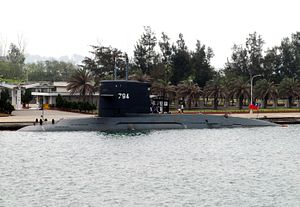Last Thursday, the U.S. House of Representatives expressed its approval of the changes the Senate had made in June to the National Defense Authorization Act for Fiscal Year 2016 (NDAA 2016), the latest iteration of an annual law that authorizes defense spending for the coming fiscal year. The House and the Senate had been logjammed over the differences between the two version of the bill, but, pending final approval by the House and Senate, NDAA 2016 will find its way to the White House for the president’s signature. The reconciled version of NDAA 2016, as with previous iterations of the U.S. defense spending legislation, affirms U.S. support for Taiwan. This year’s version, unlike last year’s, includes Taiwan among a list of countries that will receive active “assistance and training” from the United States in the South China Sea.
Section 1261 of NDAA 2016 outlines a new “South China Sea Initiative,” which appears first in a sector on “Matters Relating to the Asia-Pacific Region.” It notes that the secretary of defense is authorized to provide assistance and training to Indonesia, Malaysia, the Philippines, Thailand, Vietnam, Brunei, Singapore, and, finally, Taiwan, “for the purpose of increasing maritime security and maritime domain awareness of foreign countries along the South China Sea.”
The NDAA text also includes general support for Taiwan in line with previous iterations of the bill and the Taiwan Relations Act, which defines the U.S. relationship with Taiwan and the extent to which the United States is responsible in ensuring a robust Taiwan defense posture. Specifically, NDAA 2016 suggests that “the United States should continue to support the efforts of Taiwan to integrate innovative and asymmetric measures to balance the growing military capabilities of the People’s Republic of China, including fast-attack craft, coastal-defense cruise missiles, rapid-runway repair systems, offensive mines, and submarines optimized for defense of the Taiwan straits.”
As a side note, there was much speculation earlier this year about an amendment in the House’s version of the NDAA, which expressed support for Taiwan’s participation in the biennial Rim of the Pacific Exercise (RIMPAC) 2016 (see section 1257 here). Last week, we received confirmation following Chinese President Xi Jinping’s visit that, despite protest, the Chinese People’s Liberation Army-Navy (PLAN) had accepted a U.S. invitation to participate in RIMPAC 2016. In the reconciled version of the bill, section 1257 and the amendment to require the secretary of defense to invite Taiwan to RIMPAC 2016 has been removed. This means that Taiwan will not receive an invite to RIMPAC 2016. As Michael Thim had noted in The National Interest back in May, inviting Taipei would have elicited a negative reaction from Beijing, costing precious diplomatic capital at a time when the U.S.-China bilateral relationship isn’t exactly at an all-time high.
Though Taiwan’s participation in RIMPAC is out, section 1263 of NDAA 2016 notes that the “military forces of Taiwan should be permitted to participate in bilateral training activities hosted by the United States that increase credible deterrent capabilities of Taiwan.”

































